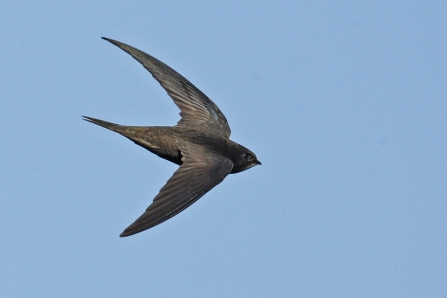
© Sean Browne

© Sean Browne
Nature-friendly farmers, planners, local authorities, wildlife experts and people who care about nature are being urged to seize a unique opportunity for new national farming and planning policies to reverse the decline of English wildlife. Nottinghamshire Wildlife Trust is asking everyone who wants to see nature’s fortunes improve to act swiftly and respond to government consultations on farming and planning which end in early May.
The consultations present a very rare opportunity – the first in living memory – to influence the future of both national farming and planning policy and how these impact on nature in England. Precious wild places and the species that depend on them have suffered catastrophic declines over the past 70 years – intensive farming and urbanisation have been major causes.* Now the public has a chance to call for a visionary approach to the environment – one that means planning rules and farm support and regulation work together towards the recovery of our nature and wildlife.
Stephanie Hilborne OBE, Chief Executive, The Wildlife Trusts, says:
There’s never been a better time to stand up for wildlife and make our voices heard. Decisions about housing and farming are fundamental to the future of wildlife in this country.Chief Executive, Stephanie Hilborne OBEThe Wildlife Trusts
They will determine whether we are able to lead the world in nature’s recovery by creating a Nature Recovery Network** or whether we will keep losing wildlife every day. So please write to the government at this critical moment and before 8 May to ask for wildlife to be taken more seriously in planning decisions – not least to call for protection for Local Wildlife Sites to be reinstated; and please have your say on agricultural policy because farmers deserve to be rewarded by the tax payer if their work benefits our society as a whole.”
The consultation on the National Planning Policy Framework is here; it closes on 10th May. The rules that guide planning for development will shape the future of housing. About 36 square miles of land are used by new developments every year and so the outcome of this consultation is hugely important for wildlife. The Wildlife Trusts want to see rules that:
The consultation on the future for food, farming and the environment is here; it closes on 8th May. It asks where public money, in the form of subsidies to farmers, should be spent in the future. It will also help to establish how the rules and standards for land management should be set and enforced. Farming practices are one of the key reasons for wildlife decline in the countryside, so if we want nature’s recovery we need a revolution in the way that farmland is managed. What works for wildlife will be good for people, too. Farmers need healthy soils and large populations of pollinators, like bees, to grow crops. We need clean, healthy water running into our rivers. We need a wildlife-rich countryside to relax in. To ensure this, The Wildlife Trusts want to see rules that:
1. Reward farmers and land managers for the benefits they provide for society, like clean water, healthy soils and a wildlife-rich countryside
2. Replace the Common Agricultural Policy with a system that supports public benefits and environmental outcomes for society
3. Changes the culture of regulation, making it easier for farmers to help nature without being weighed down by paperwork, inspections and bureaucracy
More information about The Wildlife Trusts’ #ActSwiftly campaign can be found here https://www.wildlifetrusts.org/get-involved/campaign/actswiftly Swifts arrive back to the UK in late April and early May. The swift is a bird that needs towns and the countryside to nest and feed in; it is emblematic of the need for wildlife-rich habitats in both environments.
*For information about wildlife decline see the latest State of Nature report, 2016. It shows more clearly than ever before that nature is in serious decline across the UK. Over the last 50 years, 56% of species have declined, while 15% are at risk of disappearing from our shores altogether.
** A nature recovery network is a plan for wildlife and the environment. It is a map which sets out the key sites that need to be protected and the key areas where there should be healthier habitats and more wildlife. The Wildlife Trusts believe that without a plan like this, there will be no real progress.
Swifts
Breeding
Swifts traditionally nested in hollow trees, caves, and rocky crevices. Now they have mostly become reliant on buildings, nesting under the eaves. Swifts are monogamous, pairing for life, and will return to the same nest site each year. You could have the same pair of swifts nesting under your eaves for over a decade.
Threats
IUCN cites as the major threat: building renovation, re-roofing or demolition which leads to a loss of nest sites. The design of modern buildings often leaves no space in which they can nest. Nest boxes can be added to (or even built in to) buildings to provide a nesting space for swifts. Swifts are insectivorous, requiring a large volume of flying insects. The use of pesticides (or any other actions reducing insect volume) therefore presents a serious threat.
Status
Amber conservation status in UK which means that they have suffered declines and need help. It’s hard to assess the extent of decline, but BTO data (from Breeding Bird Survey) shows a 51% decline between 1995 and 2015.